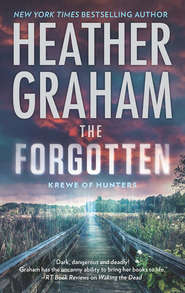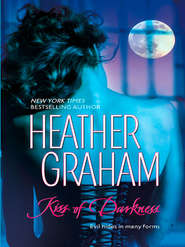По всем вопросам обращайтесь на: info@litportal.ru
(©) 2003-2024.
✖
The Evil Inside
Настройки чтения
Размер шрифта
Высота строк
Поля
But it just didn’t seem that he saw killing as one of his God’s commandments.
“I do see it all a bit differently than my father did,” Malachi added, and then tears welled in his eyes again. “He believed—he may have been mistaken sometimes, but he believed. He must be in Heaven now.”
“Of course he is,” Jenna murmured. Sam stared at her. She stared back at him. It had been the right thing to say, and she knew it. It didn’t matter if the man’s beliefs had warped his ability to be a decent father.
“Tell me what happened after you were on the cliff,” Sam said.
“I—I came home,” Malachi said. Jenna, sitting next to him, could feel him. He was trembling again, reliving the horror.
“And exactly what did you do?” Sam asked. His voice was smooth, easy. He wasn’t attacking; he was asking.
“I walked into the parlor,” he said, his voice so soft they could barely hear him. “My—my mother … She was by the hearth… . She—she was on the floor. I ran to her … I fell down on my knees. I saw … the blood, but I couldn’t believe that she was dead. I held her—and the blood was all over me. And I couldn’t bear the feel of it. I tried to get it off of me. I stood up and—and then I saw my father, over by the sofa … I started screaming. I raced up the stairs and found my uncle in one bedroom, and my grandmother … my grandmother, oh, God!” He cried out the last and buried his face in his hands, sobbing and wailing.
Jenna pulled him closer, murmuring soothing words. She stared at Sam as she felt Malachi’s body shudder against her own.
“Do you remember anything after?” Sam asked him. “Do you remember me?”
It took a long time for Malachi to answer.
“I remember Detective Alden telling me that I was under arrest, that I had killed my parents,” Malachi said dully. “I didn’t kill them. I’m not crazy, and I didn’t kill them. I loved them. My parents, my grandmother … my uncle. I loved them. I didn’t always agree with them. But they loved me, and I loved them.”
He said the words with certainty. He said the words like an innocent man. Jenna believed him.
Sam had a few more questions. She barely heard them. She sat next to Malachi Smith, trying to give him human warmth and comfort. And when it was time to go at last, she wasn’t exactly sure why, but she agreed with her uncle.
Malachi Smith was not guilty.
There was something pure about him.
She had no proof, and the evidence was against him.
But she believed in him.
When they left the facility, Sam Hall was quiet and grim.
And she realized that he, too, was experiencing the same feelings.
Sam sat at the desk in the den at his parents’ house, idly rolling a pencil in his fingers, staring at the screen of his computer and looking at the empty notepad by his side.
He’d been surprised that Malachi Smith had now made an indelible impression on him.
He shouldn’t have been so surprised, not really. From the time he had come upon the kid in the road, he’d been touched by the boy. Shaken. Not shaken. Yes … disturbed, at the least.
His client was innocent. He firmly believed it, which was good—he’d defended men when they might have been innocent, and when they might have been guilty as all hell.
He realized that he actually felt righteous about pursuing a nonguilty plea for Malachi. This case made no sense. He liked to believe that he could read people, and he knew all the little things to look for in a liar. Liars seldom made eye contact. They were fidgety, keeping their movements close to their own bodies. They had a tendency to touch their mouths, or their faces. The emotion in their words was often just slightly off or askew—acted out, rather than real.
The world was filled with very good liars, of course, but he’d spent a great deal of time in court, and he’d watched countless defendants, witnesses, prosecutors, judges, jurists and defense attorneys. He was good. The courtroom was actually one big stage, and often, the rest of a person’s life depended on how well the ad-libbed and scripted performances were played out.
He’d been at his desk an hour now, so there should have been a list of notes on his pad. He should have been to a dozen sites on the computer. He was still staring at the screen, reliving in his mind’s eye the time he had spent with Malachi Smith.
He had to shake the feeling he’d experienced with Malachi.
Sam was no longer sure what he believed in himself. He supposed that he believed in a higher power, or perhaps he wanted to believe in a higher power. No one wanted to think that their loved ones, now deceased, were nothing but decaying matter. Man had always looked to the heavens for some kind of redemption and had been inventing God around the world since the human brain had begun to recognize its own extinction.
Growing up in Salem, he’d seen everything. The old Puritanical values had died hard despite the enlightenment of man. Wiccans were finally allowed into a council of religions, but that council wasn’t recognized by the hard-core fundamentalists. Less that .03 percent of the American population was Wiccan. In Salem, poll estimates suggested that there were about 4,000 Wiccans in an area of about 40,000. Ten percent.
He mused that today they might have been considered the “tree huggers.”
Had someone killed the Smith family because of their fundamentalist beliefs?
He started writing on his notepad at last.
Abraham Smith, his wife, Beth. His mother, Abigail, his brother, Thomas. Killed at Lexington House. Earnest Covington, killed the previous week, three doors down. Six months earlier, Peter Andres, killed in his barn at Andover, just a hop, skip and jump away.
One in the barn with a scythe, one in a house with an ax, then four more in a house with an ax. It sounded like a sick game of Clue.
What did the victims have in common besides location? That was where he needed to start.
Sam rubbed his eyes. It had been a long day. He pushed away from his desk. He needed fresh air. He walked out of the house, locking it, perhaps purposely keeping his eyes downcast as he did so. He didn’t want to think about how he’d lost himself at that moment.
Boston had been easy. Take on the high-income clientele, fight like a tiger. When a client was guilty as all hell and sure to lose in court because of absolutely damning evidence, argue out the best possible deal. Hit the high-end restaurants and bars. Indulge in a few high-end affairs and avoid commitment. Relish a victory like his last with a trip down to the sun and sand, and then start all over again. Shallow, he told himself.
Yeah.
Once on the sidewalk, he looked back at the house. And he smiled with a sense of nostalgia. He’d thrown himself into his work and the lifestyle when his folks had died. Life wasn’t fair; death really wasn’t fair. He’d loved them. They’d given him everything, and they’d made him want to achieve great things because he’d wanted them to be proud.
“You’d want me on this case, wouldn’t you, Dad?” he said softly. Once upon a time, he’d been filled with righteousness. He’d believed in putting away the bad guys and going to bat for the innocent and falsely accused.
Then he’d gotten to see the legal system in action. He was still convinced that this country had what was certainly the best one in the world. And yet, even the best was filled with loopholes, inept cops, inept clerks and justices who were biased even if they were charged to comprehend and follow the law. Then, of course, Congress wasn’t always the best at writing laws, and God knew, a good speaker was a good speaker: attorneys themselves were certainly a major part of justice—and injustice.
And attorneys could become jaded. Had he let that happen?
Yes, definitely.
Maybe it was time to believe again.
Maybe that was the core of belief: people who had mattered and passed away living on in the hearts or souls of their loved ones. His father was no longer there to see him going to bat, pro bono, for the poor and ill-treated. It was something that would have pleased his parents.
He turned away from the house, surprised that he didn’t want to be alone.
I know how to be alone, Malachi Smith had said.
Sam knew how to be alone, too. He’d been an only child. But he’d grown up surrounded by love, and his parents had welcomed other children into their home. He smiled; his mother had been concerned that he wouldn’t learn how to share if she didn’t make sure he learned that he just didn’t get everything that he wanted.
He wondered what it had been like to be Malachi, shunned by others. And, yet, the boy seemed to have his own faith. Perhaps pounded into him by his father.
Perhaps made into something better in the lonely recesses in his mind.











